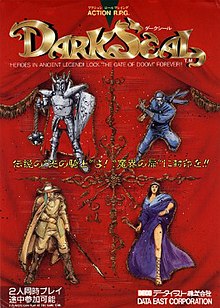Dark Seal
| Dark Seal | |
|---|---|
 Japanese arcade flyer | |
| Developer(s) | Data East |
| Publisher(s) | Data East (arcade) G-Mode (Zeebo) FTEGames (Switch, PS4) |
| Director(s) | Naomi Susa |
| Designer(s) | Yoshiyuki Urushibara |
| Programmer(s) | Sōichi Akiyama Haruyuki Kobayashi Shinichi Suzuki |
| Artist(s) | Yoshiyuki Ishibiki Masanori Tokoro Tomomi Matoba |
| Composer(s) | Tatsuya Kiuchi Tomoyoshi Sato Mihoko Ando |
| Platform(s) | Arcade, Zeebo, Nintendo Switch, PlayStation 4 |
| Release | ArcadeZeebo
|
| Genre(s) | Role-playing, beat-'em-up |
| Mode(s) | Single-player, multiplayer |
Dark Seal (ダークシール) and Dark Seal II (ダークシール II) are isometric role-playing beat-'em-up video games released for arcade by Data East in 1990 and 1992 respectively. The first game was localized in English under the title Gate of Doom and the second one as Wizard Fire.[1][2]
Gameplay
This section needs expansion. You can help by adding to it. (November 2018) |
The players control characters from an isometric perspective and must traverse levels while fighting enemies, avoiding traps, and collecting items as well as spells. The game features two-player cooperative play.
Ports
Like multiple other Data East games, the games were ported to the Zeebo by Onan Games and published by G-Mode in Brazil in 2010. Then in 2018, FTEGames ported both Gate of Doom and Wizard Fire to the Nintendo Switch's eShop as well as Gate of the Doom to the PlayStation 4 as part of their Johnny Turbo's Arcade series of Data East arcade game ports branded with the character of Johnny Turbo, the Turbo Duo mascot and alter-ego of FTEGames founder Johnny Brandstetter. FTEGames lists ports for the Xbox One, Steam and a PS4 port of Wizard Fire as under development.
Wizard Fire was also included in the 2010 Wii compilation Data East Arcade Classics by Majesco Entertainment.
Reception
This section needs expansion. You can help by adding to it. (November 2018) |
Both games received positive reviews, with the sequel being considered a noteworthy improvement overall. In Japan, Game Machine listed Dark Seal on their July 15, 1990 issue as being the most-successful table arcade unit of the year.[3] Game Machine also listed Dark Seal II on their June 15, 1992 issue as being the ninth most-successful table arcade unit of the year.[4] The original arcade games however were unfavorably compared to the side-scrolling RPG beat-'em-up Dungeons & Dragons: Tower of Doom which was published by Capcom in 1993.[5][6][7][8]
References
- ^ Wizard Fire at the Killer List of Videogames
- ^ Gate of Doom at the Killer List of Videogames
- ^ "Game Machine's Best Hit Games 25 - テーブル型TVゲーム機 (Table Videos)". Game Machine (in Japanese). No. 384. Amusement Press, Inc. 15 July 1990. p. 33.
- ^ "Game Machine's Best Hit Games 25 - テーブル型TVゲーム機 (Table Videos)". Game Machine (in Japanese). No. 428. Amusement Press, Inc. 15 June 1992. p. 25.
- ^ Kalata, Kurt (3 October 2017). "Dark Seal". Hardcore Gaming 101. Retrieved 27 November 2018.
- ^ Kalata, Kurt (3 October 2017). "Dark Seal II". Hardcore Gaming 101. Retrieved 27 November 2018.
- ^ Gonçalo, Lopes (27 June 2018). "Johnny Turbo's Arcade: Wizard Fire Review". NintendoLife. Retrieved 27 November 2018.
- ^ Doolan, Liam (17 February 2018). "Johnny Turbo's Arcade: Gate Of Doom Review". NintendoLife. Retrieved 27 November 2018.
External links
- Official websites of the FTEGames ports of Gate of Doom and Wizard Fire
